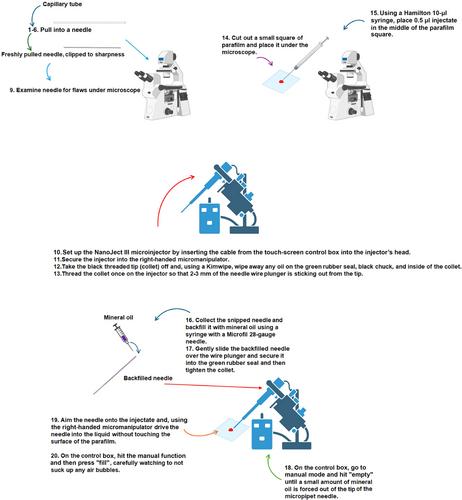下载PDF
{"title":"向日本青鳉胚胎注射含 siRNA 的正功能化四氟偶氮苯,实现光控基因沉默。","authors":"Makenzie Mateus, Matthew L. Hammill, Denina B. D. Simmons, Jean-Paul Desaulniers","doi":"10.1002/cpz1.70051","DOIUrl":null,"url":null,"abstract":"<p>This article describes the detailed methodology of how to inject photoswitchable <i>ortho</i>-functionalized tetrafluorinated short interfering RNAs (F-siRNAs) into a single cell of stage-two Japanese medaka (<i>Oryzias latipes</i>) embryos and how to control gene silencing with different wavelengths of light. Many of the prior papers describing Japanese medaka embryo injections omit key information. As such, this article aims to give an in-depth explanation as to how the NanoJect III microinjector can be used for this purpose. To obtain the embryos for microinjection, adult medaka are housed under a 14-hr light, 10-hr dark cycle to mimic their natural breeding period. This induces mating at approximately the same time each day, when the lights turn on, so recently fertilized eggs can be obtained. Synthetic F-siRNAs are injected into transgenic stage-two single-cell Japanese medaka embryos expressing enhanced green fluorescent protein (eGFP). Our data demonstrate that our F-siRNAs can silence gene activity in Japanese medaka embryos expressing eGFP. Moreover, gene expression can be activated by exposing F-siRNA-injected embryos to blue light and deactivated a few days after exposure to green light. To the best of our knowledge, this marks the first reversible control of a gene-silencing oligonucleotide within an <i>in vivo</i> system. © 2024 The Author(s). Current Protocols published by Wiley Periodicals LLC.</p><p><b>Basic Protocol 1</b>: Medaka maintenance and embryo collection</p><p><b>Basic Protocol 2</b>: Injection of stage-two one-cell medaka embryos</p><p><b>Basic Protocol 3</b>: Evaluation of the F-siRNA gene-silencing ability through light activation and inactivation using blue and green light by measuring enhanced green fluorescent protein fluorescence</p>","PeriodicalId":93970,"journal":{"name":"Current protocols","volume":"4 11","pages":""},"PeriodicalIF":0.0000,"publicationDate":"2024-11-15","publicationTypes":"Journal Article","fieldsOfStudy":null,"isOpenAccess":false,"openAccessPdf":"https://onlinelibrary.wiley.com/doi/epdf/10.1002/cpz1.70051","citationCount":"0","resultStr":"{\"title\":\"Injection of Ortho-Functionalized Tetrafluorinated Azobenzene-Containing siRNAs into Japanese Medaka Embryos for Photocontrolled Gene Silencing\",\"authors\":\"Makenzie Mateus, Matthew L. Hammill, Denina B. D. Simmons, Jean-Paul Desaulniers\",\"doi\":\"10.1002/cpz1.70051\",\"DOIUrl\":null,\"url\":null,\"abstract\":\"<p>This article describes the detailed methodology of how to inject photoswitchable <i>ortho</i>-functionalized tetrafluorinated short interfering RNAs (F-siRNAs) into a single cell of stage-two Japanese medaka (<i>Oryzias latipes</i>) embryos and how to control gene silencing with different wavelengths of light. Many of the prior papers describing Japanese medaka embryo injections omit key information. As such, this article aims to give an in-depth explanation as to how the NanoJect III microinjector can be used for this purpose. To obtain the embryos for microinjection, adult medaka are housed under a 14-hr light, 10-hr dark cycle to mimic their natural breeding period. This induces mating at approximately the same time each day, when the lights turn on, so recently fertilized eggs can be obtained. Synthetic F-siRNAs are injected into transgenic stage-two single-cell Japanese medaka embryos expressing enhanced green fluorescent protein (eGFP). Our data demonstrate that our F-siRNAs can silence gene activity in Japanese medaka embryos expressing eGFP. Moreover, gene expression can be activated by exposing F-siRNA-injected embryos to blue light and deactivated a few days after exposure to green light. To the best of our knowledge, this marks the first reversible control of a gene-silencing oligonucleotide within an <i>in vivo</i> system. © 2024 The Author(s). Current Protocols published by Wiley Periodicals LLC.</p><p><b>Basic Protocol 1</b>: Medaka maintenance and embryo collection</p><p><b>Basic Protocol 2</b>: Injection of stage-two one-cell medaka embryos</p><p><b>Basic Protocol 3</b>: Evaluation of the F-siRNA gene-silencing ability through light activation and inactivation using blue and green light by measuring enhanced green fluorescent protein fluorescence</p>\",\"PeriodicalId\":93970,\"journal\":{\"name\":\"Current protocols\",\"volume\":\"4 11\",\"pages\":\"\"},\"PeriodicalIF\":0.0000,\"publicationDate\":\"2024-11-15\",\"publicationTypes\":\"Journal Article\",\"fieldsOfStudy\":null,\"isOpenAccess\":false,\"openAccessPdf\":\"https://onlinelibrary.wiley.com/doi/epdf/10.1002/cpz1.70051\",\"citationCount\":\"0\",\"resultStr\":null,\"platform\":\"Semanticscholar\",\"paperid\":null,\"PeriodicalName\":\"Current protocols\",\"FirstCategoryId\":\"1085\",\"ListUrlMain\":\"https://onlinelibrary.wiley.com/doi/10.1002/cpz1.70051\",\"RegionNum\":0,\"RegionCategory\":null,\"ArticlePicture\":[],\"TitleCN\":null,\"AbstractTextCN\":null,\"PMCID\":null,\"EPubDate\":\"\",\"PubModel\":\"\",\"JCR\":\"\",\"JCRName\":\"\",\"Score\":null,\"Total\":0}","platform":"Semanticscholar","paperid":null,"PeriodicalName":"Current protocols","FirstCategoryId":"1085","ListUrlMain":"https://onlinelibrary.wiley.com/doi/10.1002/cpz1.70051","RegionNum":0,"RegionCategory":null,"ArticlePicture":[],"TitleCN":null,"AbstractTextCN":null,"PMCID":null,"EPubDate":"","PubModel":"","JCR":"","JCRName":"","Score":null,"Total":0}
引用次数: 0
引用
批量引用


